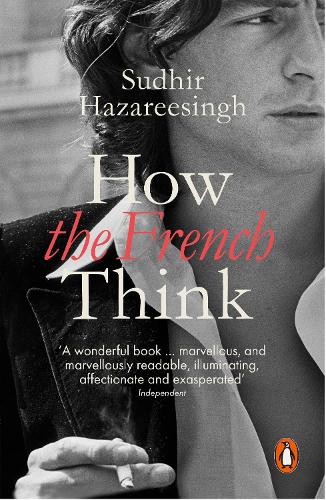
How the French Think: An Affectionate Portrait of an Intellectual People
(Paperback)
Publishing Details
How the French Think: An Affectionate Portrait of an Intellectual People
By (Author) Sudhir Hazareesingh
Penguin Books Ltd
Penguin Books Ltd
15th August 2016
30th June 2016
United Kingdom
Classifications
General
Non Fiction
History of ideas
194
Physical Properties
Paperback
448
Width 129mm, Height 198mm, Spine 25mm
342g
Description
The French- orderly and anarchic, serious and frivolous, charming and infuriating, rational and mystical, pessimistic, pleasure-loving - and perhaps more than any other people, intellectual. From philosophers to Asterix, this original and entertaining book shows just exactly what makes the French so . . . French. WINNER OF THE GRAND PRIX DU LIVRE D'ID ES The French- serious and frivolous, charming and infuriating, rational and mystical, pessimistic, pleasure-loving - and perhaps more than any other people, intellectual. This original and entertaining book shows exactly what makes the French so ... French.
Reviews
There could be no wiser or more witty guide to the problems of France today. -- Julian Jackson * Times Literary Supplement *
A first-rate book... Sudhir Hazareesingh, brings an engaging personal angle to his ambitious cavalcade through four centuries of French intellectual thought... This vast, opinionated and wholly original book reminds us that ideas still count and that intellectual endeavour still has resonance in the face of the mercantile plutocracy that so much defines the way we live now. -- Douglas Kennedy * New Statesman *
This book depicts Parisian society like a Cambridge party in which everyone knows the jokes, and everyone knows where the bodies are buried. You will read it not just with fascination, but with relish. -- Jonathan Clark * Times Literary Supplement (Books of the Year) *
Author Bio
Sudhir Hazareesingh was born in Mauritius. He is a Fellow of the British Academy and has been a Fellow and Tutor in Politics at Balliol College, Oxford, since 1990. Among his books are The Legend of Napoleon(Granta, 2004) and Le Mythe Gaullien (Gallimard, 2010). He won the Prix du Memorial d'Ajaccio and the Prix de la Fondation Napoleon for the first of these, and a Prix d'Histoire du Senat for the second.
